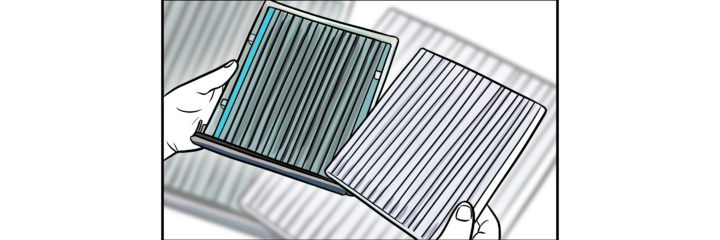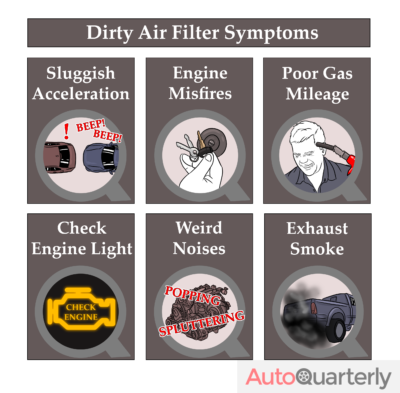Answer this question honestly: how often do you check your car’s air filter? Once a year? Once every two years? Perhaps never? Most people know that their car has an air filter, but not that many people bother to check what condition it’s in.
A dirty air filter can mess with your engine and result in a range of issues appearing. These issues can be caused by other more serious faults, although they may be caused by something as simple as a dirty air filter.
You can’t clean a dirty air filter, but you can replace it. The good news is that air filters are dirt cheap, so there’s no reason not to change it if it’s bad. Join us in this article as we look at everything you need to know about dirty engine air filters.
- What Does an Air Filter Do?
- Cabin Filter vs. Engine Air Filter
- Why a Dirty Air Filter Is Bad News
- Dirty Air Filter Symptoms
- When Should the Air Filter Be Replaced?
- Checking the Condition of Your Car’s Air Filter
- How Much Does a Replacement Air Filter Cost?
- Can I Replace the Air Filter Myself?
- Filtering It Out
What Does an Air Filter Do?
As the name suggests, an air filter filters the air entering your engine. Its job is to prevent any dirt and debris, like stones or leaves, from getting into the engine, where it could cause serious damage to internal components. It’s the first line of defense when it comes to protecting your engine from external contaminants. For example, debris that’s the size of a grain of sand can cause significant damage to your intake manifold, piston rings, and cylinders.
Air filters are made from either paper, cloth, or some type of spun fiberglass material. They have many layers and remain rigid due to an outer cardboard frame. As with any type of filter, engine air filters get dirty over time and become blocked.
While this is normal and expected, air filters should be changed at certain intervals. A blocked air filter will prevent enough air from entering the engine, causing a wide range of symptoms that we’ll explore later on.
Cabin Filter vs. Engine Air Filter
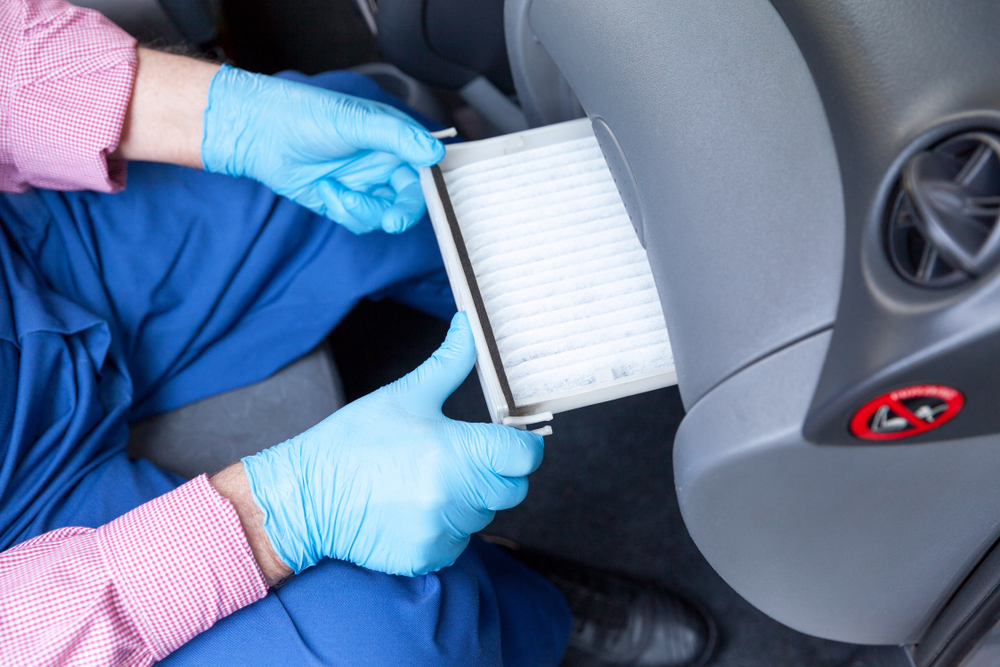
Before we go any further, it’s a good idea to point out that there are two types of filters in your vehicle. There’s a cabin filter and an engine air filter. The two often get mixed up. This article only covers issues relating to engine air filters, but we will briefly discuss them both here.
A cabin filter removes pollutants, like pollen and smoke, from the air that enters the car’s cabin via the HVAC system. This air is the air that you breathe while inside the car. These filters also need replacing now and then as they too can become blocked and cause foul smells inside your car.
An engine air filter also removes pollutants and contaminants; however, this is from the air that enters the engine via the air intake system. This is the air that your car is essentially breathing.
Why a Dirty Air Filter Is Bad News
For your car’s engine to run correctly, it needs three things: air, fuel, and a source of ignition. In addition to needing all of these things, your engine also needs them in the right quantity; think of your engine as an air-pump.
Fuel is straightforward: it’s either diesel or gasoline. An ignition source will either be spark plugs in a gasoline engine and heat and pressure in a diesel engine. As for air, that’s the air that passed through the air filter into the air intake system.
Your engine will then create an air-fuel mixture that’s pushed into the cylinders and ignited. For complete combustion to occur, the air-fuel ratio has to be just right. An imbalance in the amount of air or fuel will result in a badly running engine.
Your car’s engine control unit is pretty smart. The ECU will detect when the air-fuel ratio is off and make adjustments as needed. For example, if there’s not enough air, it’ll reduce the amount of fuel injected into the cylinder. That will maintain the stable running of the engine. However, the ECU can only adjust so far before some limits are reached.
Your car’s engine will run rich when there’s not enough air entering the engine due to a dirty air filter. Running rich will cause carbon deposits to form in your cylinders, which can lead to misfires and other engine issues. Let’s take a look at these symptoms.
Dirty Air Filter Symptoms
Below are six symptoms you may experience when your air filter is bad.
Sluggish Acceleration
A dirty air filter will restrict the flow of air into the engine, causing rich running and incomplete combustion in the cylinders. This causes sluggish acceleration, which will be most noticeable when driving up an incline.
In some cases, your car will struggle to get up to speed, which isn’t good if you’re trying to join fast-moving traffic on the highway. Some negative changes in your car’s performance can be caused by a dirty air filter.
Engine Misfires
The reduced air supply to the engine results in an incorrect air-fuel ratio, with too much fuel to air in the fuel mixture. While your car’s ECU will try to correct this, it can only do so much before certain fuel trim limits are reached.
Once the limits have been reached, your engine may begin to misfire. Misfires will cause rough running, bad idling, and jerking when driving your car. They will also affect the car’s performance and fuel economy. If engine misfires are not fixed, it can lead to engine knocking, which is fatal for your engine.
Poor Gas Mileage
Many things can cause poor gas mileage, one of them being a dirty air filter. As with the previous point, there will be an imbalance of fuel to air, resulting in incomplete combustion in the cylinders.
This means that fuel is injected but not burnt, which is then wasted. You’ll notice that your car gets a worse MPG reading if this is happening, and you may end up filling the tank more often.
Check Engine Light
Your car’s ECU monitors how the engine is running and makes adjustments when it can to correct any issues. However, if something is seriously wrong, the ECU will cause the check engine light (CEL) to illuminate on your dashboard.
This can happen for many reasons, so it’s a good idea to use an OBD scanner to look for fault codes. A dirty air filter can cause this light to come on, though.
The mass airflow (MAF) sensor measures the volume of air entering the engine and gives this information to the ECU. If the ECU sees that there’s not enough air coming in, it’ll log a fault code and trigger the CEL.
It can also come on when the ECU has reached its limit of reducing the fuel trims caused by reduced airflow into the engine. At some point, the fuel can’t be restricted any further; thus, the light comes on to warn you that there’s a problem.
Weird Noises
Normal functioning engines don’t make weird noises. A dirty air filter can cause weird noises to appear when your car is idling. You may notice a popping or spluttering coming from the engine, indicating that the engine is misfiring due to a lack of air.
You may also hear a whooshing noise when driving at speed; this is normal in some vehicles. It doesn’t mean that anything is wrong; rather, it’s caused by air being sucked into the engine.
Exhaust Smoke
The exhaust shouldn’t have smoke coming out from it; the only time you should see smoke is during the winter months when water vapor is being produced.. Exhaust smoke can be caused by a blown head gasket, as coolant can leak into the engine cylinders where it’s burned. If the smoke is caused by coolant, it’ll be a blueish-white color and have a sweet smell.
However, if the smoke is dark, it’s probably unburnt fuel. This is more common in diesel engines than gasoline engines as the smoke is thicker and blacker.
When Should the Air Filter Be Replaced?
Air filters should be periodically replaced as outlined in your car manufacturer’s servicing schedule. Most manufacturers recommend replacing the air filter every 10,000 to 15,000 miles or once every 12 months. It makes sense to replace the air filter at every routine service, at the same time as the oil and oil filter.
That said, if you live somewhere dry and dusty like Southern California or Southwest Arizona, your air filter will become dirty and clogged quicker. Similarly, if you live in a built-up area with a lot of traffic and pollution, your air filter will need replacing more often. In either case, you will want to change the air filter more regularly to avoid any issues; every 6,000 miles or twice per year should be sufficient.
Checking the Condition of Your Car’s Air Filter
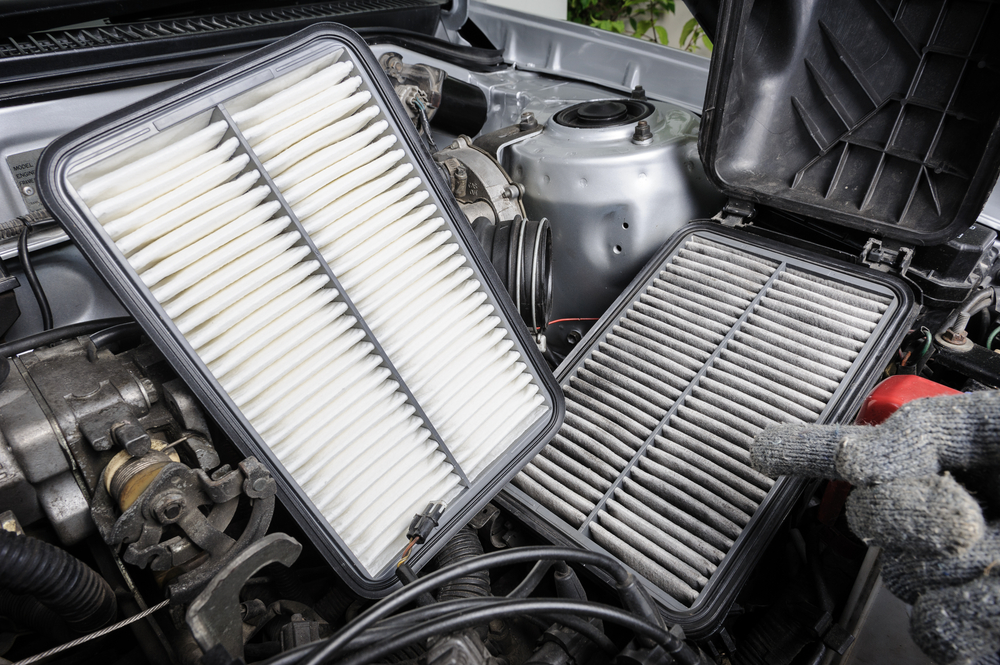
If you suspect that your car’s air filter is dirty because you’re experiencing some of the symptoms listed above, you may want to check the filter’s condition to be sure it is a problem. Thankfully, checking the condition of the air filter is quick and easy, and you don’t need any specialized tools to do it (apart from a screwdriver).
Your air filter will start to darken and have visual contamination when it’s bad, just like how a vacuum cleaner’s filter gets dirty. That’s not always the case, though. The outside of the filter may appear to be clean, while the inside is full of dust and dirt.
A good rule of thumb is if the air filter looks clean and is under a year old, keep using it. If you’ve done more than 15,000 miles or it has been over a year since it was last changed, you should replace it, even if it looks clean. An air filter is cheap and easy to change, so there’s no reason not to change it if you suspect it’s causing problems.
Another way to check on the status of your air filter is to remove it from your car’s intake manifold. Once you remove it, run your finger along the piping. If you notice dust on your finger, it’s time to replace the filter. Additionally, if you’re running an aftermarket air filter, it’s important to check with the manufacturer because some are reusable.
How Much Does a Replacement Air Filter Cost?
Air filters are cheap: a budget air filter can be picked up for $10. OEM air filters are a little more expensive, but they’ll still only cost between $15 and $25. You may need to purchase a more expensive air filter for high-end vehicles, but even those will cost $50 or less.
If you don’t want to change the air filter yourself, you can pay a garage to do it for you. It’s a 30-minute job at most, so a garage should charge around $50 for labor, although that price will vary depending on the garage you take your car to and their hourly rate.
Can I Replace the Air Filter Myself?
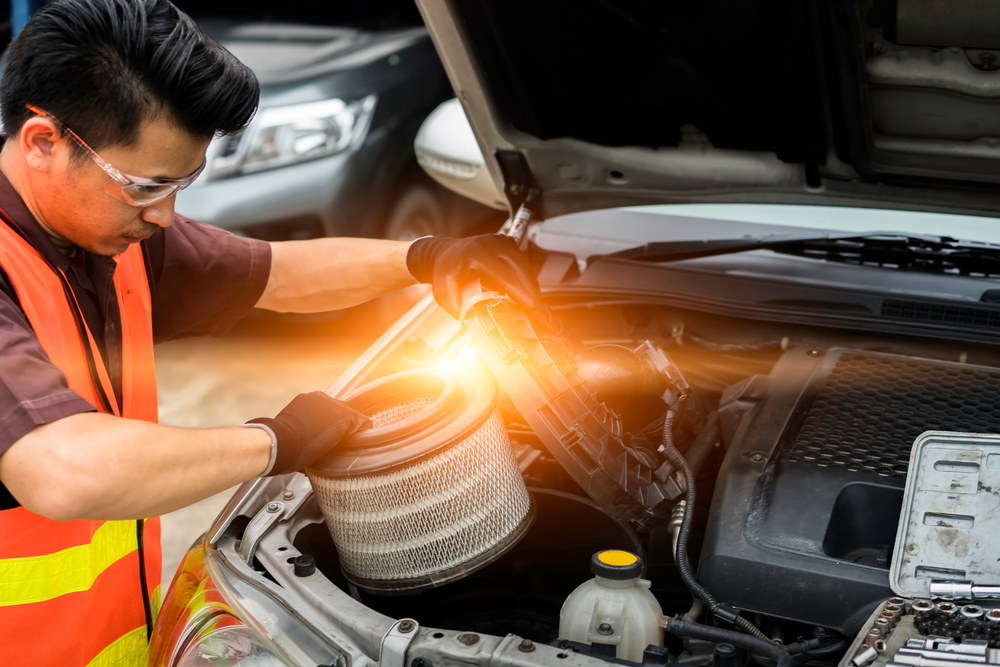
You sure can. No matter if you’re a car expert or know nothing about cars, changing an air filter is really easy. You need no mechanical knowledge and no tools in most cases. Some vehicles can be tricky to change the filter by design, but it’s a piece of cake for the vast majority of cars.
You can have a new filter fitted in just 5 minutes if it is easily accessible. Even if the filter is harder to access, it still shouldn’t take longer than 30 minutes or 1 hour tops if you stop for lots of breaks.
DIY replacement is the preferred option for many people as they can save up to $50 in labor costs and not have to drive their car to a garage. Even so, some people would prefer to let a garage do it — that’s fine too.
For full details on how to change an air filter, check out this video.
Filtering It Out
A bad air filter will mess with your engine’s air-fuel ratio and cause various symptoms that reduce engine performance, as we’ve seen in our list of symptoms.
Because air filters are super cheap to buy and embarrassingly easy to replace, it’s best to pick up a new filter and fit it as soon as you can.
